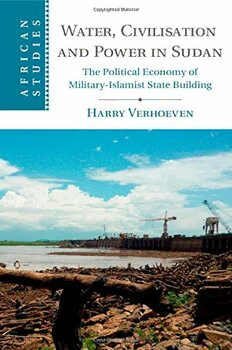
Water, Civilisation and Power in Sudan: The Political Economy of Military-Islamist State Building PDF
Preview Water, Civilisation and Power in Sudan: The Political Economy of Military-Islamist State Building
Water,CivilisationandPowerinSudan In1989,asecretivemovementofIslamistsallieditselftoamilitarycabal toviolentlytakepowerinAfrica’sbiggestcountry.Sudan’srevolution- aryregimewasbuiltonfourpillars–anewpolitics,economicliberalisa- tion, an Islamic revival, and a U-turn in foreign relations – and mixed militantconservatismwithsocialengineering:avisionofauthoritarian modernisation. Waterandagricultural policyhave beencentral tothis state-buildingproject.Goingbeyondtheconventionallensesoffamine, “waterwars”ortheoilresourcecurse,HarryVerhoevenlinksenviron- mental factors, development and political power. Based on years of unique access to the Islamists, generals and business elites at the core of the Al-Ingaz (Salvation) Revolution, Verhoeven tells the story of one of Africa’s most ambitious state-building projects in the modern era – and how its gamble to instrumentalise water and agriculture to consolidate power is linked to twenty-first-century globalisation, IslamistideologyandtheintensifyinggeopoliticsoftheNile. HarryVerhoeventeachesAfricanpoliticsatOxfordUniversityandisthe founderandconvenoroftheOxfordUniversityChina-AfricaNetwork,as wellasthefounderoftheOxfordCentralAfricaForum.Hehaspublished in Civil Wars; Conflict, Security & Development; Development and Change; Geopolitics; Journal of Eastern African Studies; Journal of ModernAfricanStudies;MiddleEastPolicy;PhilosophicalTransactions of the Royal Society; Review of African Political Economy and The Washington Quarterly. InJanuary 2015, hetook up a professorshipin comparativepoliticsandinternationalrelationsattheSchoolofForeign ServiceofGeorgetownUniversity,basedinQatar. The African Studies series, founded in 1968, publishes research monographs by emergingandseniorscholarsthatfeatureinnovativeanalysesinthefieldsofhistory, politicalscience,anthropology,economicsandenvironmentalstudies.Theseriesalso producesmature,paradigm-shiftingsynthesesthatseektoreinterpretandrevitalisethe scholarlyliteratureinthesefields. EditorialBoard DavidAnderson,UniversityofWarwick CatherineBoone,LondonSchoolofEconomics CarolynBrown,RutgersUniversity ChristopherClapham,UniversityofCambridge MichaelGomez,NewYorkUniversity NancyJ.Jacobs,BrownUniversity RichardRoberts,StanfordUniversity DavidRobinson,MichiganStateUniversity LeonardoA.Villalón,UniversityofFlorida Alistofbooksinthisserieswillbefoundattheendofthisvolume. Water, Civilisation and Power in Sudan The Political Economy of Military-Islamist State Building HARRY VERHOEVEN OxfordUniversity 32AvenueoftheAmericas,NewYork,ny10013-2473,usa CambridgeUniversityPressispartoftheUniversityofCambridge. ItfurtherstheUniversity’smissionbydisseminatingknowledgeinthepursuitof education,learningandresearchatthehighestinternationallevelsofexcellence. www.cambridge.org Informationonthistitle:www.cambridge.org/9781107061149 ©HarryVerhoeven2015 Thispublicationisincopyright.Subjecttostatutoryexception andtotheprovisionsofrelevantcollectivelicensingagreements, noreproductionofanypartmaytakeplacewithoutthewritten permissionofCambridgeUniversityPress. Firstpublished2015 PrintedintheUnitedStatesofAmerica AcatalogrecordforthispublicationisavailablefromtheBritishLibrary. LibraryofCongressCataloginginPublicationData Verhoeven,Harry,author. Water,civilisationandpowerinSudan:thepolitical economyofmilitary-Islamiststatebuilding/Harry Verhoeven,UniversityofOxford. pages cm.–(TheAfricanstudiesseries;131) Includesbibliographicalreferences. 1. Waterresourcesdevelopment–Governmentpolicy–Sudan. 2. Water-supply–Politicalaspects–Sudan. 3. Water-supply–Political aspects–NileRiver. 4. Barrages–Politicalaspects–NileRiver. 5. Dams–Politicalaspects–Sudan. 6. Economicdevelopment–Political aspects–Sudan. 7. Sudan–Politicsandgovernment–1985– 8. Islamandpolitics–Sudan. I. Title. II. Series:Africanstudies series(Cambridge,England);131. hd1699.s8v47 2015 333.911509624–dc23 2014043735 isbn978-1-107-06114-9Hardback CambridgeUniversityPresshasnoresponsibilityforthepersistenceoraccuracyof urlsforexternalorthird-partyInternetWebsitesreferredtointhispublication anddoesnotguaranteethatanycontentonsuchWebsitesis,orwillremain, accurateorappropriate. Contents ListofFigures,TablesandPictures pageix Map:SudanandtheNileBasin xi Acknowledgements xiii Prologue:TheInaugurationoftheMeroweDam 1 TheArgument 3 SituatingtheBook 7 1 StateBuilding,theEnvironmentandtheCivilisationMission 12 ImaginingtheEnvironment:ParadigmsofDevelopment, CooperationandConflict 13 NeitherCornucopiaNorDystopia:PoliticalEcology,the StateandViolence 21 2 HydraulicCivilisationandLandofFamine:TheCraftingof theSudaneseStateandItsSourcesofPower 36 EgyptUnderthePharaohs:AVeryDifferentLogicofWater, CivilisationandPower 38 TheNileasaProductofModernity:MuhammadAliandthe ReinventionoftheWater-AgricultureNexus 43 ColonisingtheNile:Slavery,HydropoliticsandStateBuilding inSudan 47 “SudanMustFeedtheWorld”:TheFataMorganaof BecomingtheRegionalBreadbasket 63 Conclusion 80 3 MashruAl-Hadhari:TheRiseofSudan’sAl-IngazRegimeand ItsCivilisationProject 83 TheRiseoftheIslamists:Ideas,PowerandMoney 85 SalvationforSudan:TheRevolutionandItsVision 94 vii viii Contents MashruAl-Hadhari:BuildingaNewState,aNewEconomy andaNewSociety 100 Conclusion 114 4 TheHydro-PoliticalEconomyofAl-Ingaz:Economic SalvationThrough“DamsareDevelopment” 116 TheSalvationOverreaches:Al-IngazandItsContradictionsin theLate1990s 118 TheHydro-AgriculturalMission:Al-IngazReinventsItself 124 TheHamdiTriangleandIslamistHegemony:TheGrand StrategyBehindtheHydro-AgriculturalMission 136 Conclusion 150 5 TheGeopoliticsoftheNile:Khartoum’sDamProgramme andAgriculturalRevivalintheGlobalPoliticalEconomy 151 TheShadowofthePharaohs:EgyptandtheHydropolitical StatusQuo 152 The“New”GlobalPoliticalEconomyoftheNile:TheGulf Arabs 164 “ASino-SudaneseModelofDevelopment”:Chinaandthe EconomicSalvationAgenda 176 HowAl-IngazChangedtheNileBasin:SudanandtheErosion oftheHydropoliticalStatusQuo 182 Conclusion 189 6 Military-IslamistStateBuildingandItsContradictions: MiragesintheDesert,SouthSudan’sSecessionandtheNew HydropoliticsoftheNile 191 TheAchilles’HeelofAl-Ingaz:TheFailureoftheHydro- AgriculturalMission 192 Water,CivilisationandPowerinthePeripheries:Novelty,Not Change 215 TheNile’sNewHydropolitics 236 Conclusion 247 Conclusion:Water,CivilisationandPower 249 WaterandPower:StateBuilding’sViolentContradictionsand Sudan’sHydro-PoliticalEconomy 250 WaterandCivilisation:StateBuildinginSudanandDiscursive Entrapment 258 Damsas“TemplesofModernity”and“VeinsoftheNation” 262 Islamism,IlliberalStateBuildingandtheNewGeopoliticsof Water:Sudan’sSalvationExperimentasaModel? 267 Appendix:EliteInterviewsandIn-DepthTestimonies 275 Bibliography 283 Index 307
